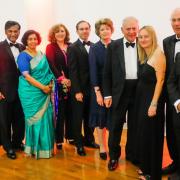Science is still seen as a subject for boys but we visit one school where girls are certainly making their mark

It sounds like a statistic from Victorian times but it was a recent survey of parents that found just one per cent of them wanted their daughters to become engineers. It’s shocking when you consider the majority of jobs in the future will rely on STEM skills – that’s science, technology, engineering and maths.
It means that at least 50 per cent of the next generation of workers will be ill-equipped to meet industry’s needs and that could be very bad news for the UK’s ability to compete on the global stage.
Today, just nine per cent of UK engineering jobs are occupied by women compared to 20 per cent in Italy and 26 per cent in Sweden. While girls continue to outperform boys in exams, it seems few go on to use that knowledge in the workplace. In this, we are bottom of the league in Europe.
However, there are schools trying to change attitudes and with a considerable degree of success. One of the most notable is Bolton School, a long-established independent with the sort of resources that allow it to provide their senior girls with iPads.

The school has an enviable success rate in the Arkwright Scholarship – a national scheme that recognises and rewards students who have demonstrated the ability to design and build a product as well as showing a determination to pursue a career in engineering.
This success has helped to raise the profile of STEM subjects at Bolton School. Head of the girls’ school Sue Hincks says she and her team have been actively promoting it to girls and support that by having specialist teachers.
It seems to pay off with half the girls doing well in chemistry and biology at A level. ‘We have large number of girls who have gone on to study medicine, aeronautics and engineering – civil, pharmaceutical and biotechnology,’ she says.
‘They have done exceptionally well despite the fact that in the past these subjects might not have been considered quite so sexy. It helps when you have a good looking physics presenter like Brian Cox on TV.
‘There is no reason why girls shouldn’t be every bit as good as boys. Their dexterity is definitely as good and they approach problems in a different and more collaborative way. I think they might also be more people-focused. When they approach a problem they also look at the impact on individuals.’
One of Bolton School’s specialist teachers is Rachel Langley, head of resistant materials, a subject which can see girls working with metals, plastics and wood and using lasers as well as traditional tools. ‘There has been a very definite increase in the number of our girls taking STEM subjects at A level. There now seems much more confidence about taking what were once considered to be boys’ subjects,’ she said.
‘Often, they are involved in intricate work and I’m not sure all boys would have the patience for such precision.’
Head of physics, Ray Ball, adds: ‘In the last five years there has been an annual increase in the number of girls taking physics. Far more are talking about a career in engineering. It is partly the Brian Cox effect.
‘I’ve taught in mixed sex classes and I think some very able girls are held back because these are considered to be boys’ subjects and girls were worried about asking what might be seen as silly questions. In a single sex environment they feel more confident.’
Amy Kadodwala, a 17-year-old pupil from Warrington, wants a career in particle science. She helps to run a science club to encourage younger girls to take an interest and one of her recent projects was building a small robot.
‘My parents work in banking so I don’t appear to get my interest in science from them,’ says Amy. ‘But they are completely supportive. A lot of people say girls are creative and boys are logical. But girls can be logical and creative and there are opportunities opening up for us all the time.’



























